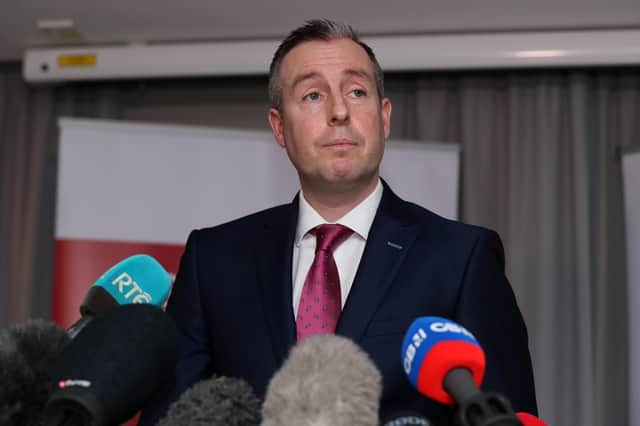Owen Polley: The Stormont executive has failed over years, not just a few weeks


We really have the worst luck. After years of achieving little, the devolved government collapsed just as it was about to cause a thousand political flowers to bloom. Does this narrative, promoted by some of the DUP’s opponents, hold up?
You may remember that the last Assembly election took place on March 2 2017, two months after Martin McGuiness collapsed power-sharing. Sinn Fein refused to share power for almost three more years, before an Executive was finally formed in January 2020. That is now over two years ago.
Advertisement
Hide AdAdvertisement
Hide AdThe Assembly is due to dissolve on March 28, ahead of the 2022 election, so Givan’s resignation deprived the Executive of 46 working days out of a potential five-year term.
Admittedly, the Covid-19 pandemic preoccupied politicians for large parts of the past two years. But are we really expected to believe that ministers left their most important work to the fag-end of their mandate?
Predictably, the most shameless advocate of this position is Sinn Fein. The party’s Finance Minister, Conor Murphy, claims he was on the brink of delivering a three-year budget that would have helped slash hospital waiting lists.
Only weeks ago, this budget was criticised strongly by the Northern Ireland Fiscal Council (NIFC); a body set up, as part of the New Decade New Approach deal, to scrutinise the public finances and provide some ‘transparency’ on the Executive’s use of taxpayers’ money.
Advertisement
Hide AdAdvertisement
Hide AdThe NIFC stated baldly that the budget lacked a coherent strategy and failed to set out its priorities clearly. It noted the minister’s idea was to boost the health budget and slash other departments’ funding. But it found little evidence that there was a plan to make sure the extra health money was spent effectively, or that the consequences of cuts elsewhere had been thought through.
At the very best, then, the budget was a hugely controversial document whose likely repercussions were unknown. Its merits were contested hotly by professionals in sectors like education and justice, as well as rival politicians, including the DUP.
A public consultation was scheduled to end only on March 7. At its conclusion, this process would have resulted in countless detailed submissions completed by lobbyists, organisations and individuals who expected their contributions to be considered carefully.
We’re now invited to believe that all of this information could have been read, digested and discussed properly by the minister and his department, the finance committee, the Executive and the Assembly, all by March 28. The implications of the budget would have been carefully assessed, it would have been agreed by the Executive and debated thoroughly by MLAs in less than 14 working days.
Advertisement
Hide AdAdvertisement
Hide AdEven if‘ ‘accelerated passage’ for the budget had been achieved, it seems probable it would have been at the expense of scrutiny and accountability. The consultation would have been little more than a box-ticking sham. Far more likely, this contested budget would not have been passed at all.
Similarly, last week, Sinn Fein’s Communities Minister, Deirdre Hargey, claimed that she could not deliver much-needed funding for Irish League football grounds, because of Givan’s resignation. The clubs reacted with disbelief, because this money was first promised in 2011 and subsequently described as ‘ring-fenced’.
Hargey later seemed to backtrack, with NIFL bosses saying they’d gained assurances that the spending would go ahead ‘as planned’. Football fans will take little comfort from that, as similar promises have been strung out for over 10 years, but it showed-up Sinn Fein’s willingness to use Givan’s resignation as a catch-all excuse.
They’re not the only party to employ this tactic. The Ulster Unionists have been saying similar things about the health budget. Last week, North Down MLA, Alan Chambers, said NHS reforms were “on hold”, thanks to the “DUP’s decision to collapse the Executive”.
Advertisement
Hide AdAdvertisement
Hide AdYou could be forgiven for having a hollow laugh at this, if you’d followed the endless sequence of undelivered reports that marked Stormont’s failure, since its inception, to reform the health service. As one tweeter asked, if there is now a detailed, timed and costed plan to reorganise the NHS properly, where can we read it?
Ironically, the scramble to treat Paul Givan’s resignation as if it were the end of the world revealed how little the Northern Ireland Executive has actually achieved. The DUP is reluctant to point this out, as it is culpable in that failure.
However, as voters, we are not stupid enough to be taken in by the idea that our political leaders were about to embark on two months of unprecedented productivity, before their plans were scuppered by Paul Givan.
——— ———
A message from the Editor:
Thank you for reading this story on our website. While I have your attention, I also have an important request to make of you.
Advertisement
Hide AdAdvertisement
Hide AdWith the coronavirus lockdowns having had a major impact on many of our advertisers — and consequently the revenue we receive — we are more reliant than ever on you taking out a digital subscription.
Subscribe to newsletter.co.uk and enjoy unlimited access to the best Northern Ireland and UK news and information online and on our app. With a digital subscription, you can read more than 5 articles, see fewer ads, enjoy faster load times, and get access to exclusive newsletters and content.
Visit
now to sign up.
Our journalism costs money and we rely on advertising, print and digital revenues to help to support them. By supporting us, we are able to support you in providing trusted, fact-checked content for this website.
Ben Lowry, Editor